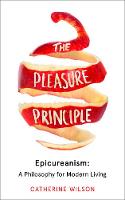


|
|
| book details |
The Pleasure Principle: Epicureanism: A Philosophy for Modern Living
By (author) Catherine Wilson

|
This book is currently unavailable. Enquire to check if we can source a used copy
|
| book description |
In our troubled world, looking back to ancient wisdom can shed light on fresh solutions. For years, many of us have upheld the Stoic belief in 'no pain, no gain.' But when the pace of modern life and the demands of jobs and family overwhelm us, punishing exercise regimes, productivity apps and early morning starts may not be the best solution. According to the pleasure-centric philosophy of Epicureanism, life can be good without great sacrifice. By consciously practicing 'choice and avoidance' - by being strategic about our recreational, professional and familial pursuits - we can live with less fear and regret. By understanding our place in a world that came about by chance, we can gain greater perspective on our role within it and where our priorities should lie. No honest philosopher can give you a formula for happiness, but in The Pleasure Principle, Professor Catherine Wilson explores how Epicureanism can provide a framework for thinking about life's key issues, including family, death, politics, religion, wealth, science, and love.
| product details |
Normally shipped |
Publisher | HarperCollins Publishers
Published date | 6 Aug 2020
Language |
Format | Paperback / softback
Pages | 304
Dimensions | 198 x 129 x 0mm (L x W x H)
Weight | 270g
ISBN | 978-0-0082-9170-9
Readership Age |
BISAC | philosophy / history & surveys / ancient & classical
| other options |
|
|
|
To view the items in your trolley please sign in.
| sign in |
|
|
|
| specials |
|
|

|
Mason Coile
Paperback / softback
224 pages
was: R 520.95
now: R 468.95
|
A terrifying locked-room mystery set in a remote outpost on Mars.
|
An epic love story with the pulse of a thriller that asks: what would you risk for a second chance at first love?
|
|
|
|
|